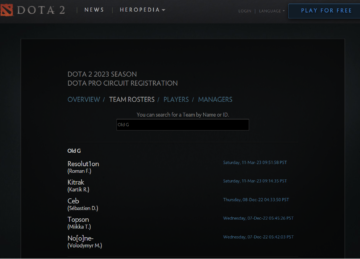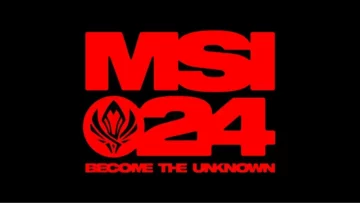A narrative design company called Sweet Baby Inc. is under fire for ‘wokeism’, in a movement some are referring to as GamerGate 2.0.
If you’ve seen the word ‘GamerGate’ suddenly get thrown around again over the last few weeks, you likely saw it used in reference to a company called Sweet Baby Inc. The narrative design company flew relatively under the radar despite its involvement in some of the last few years’ most prominent game releases, but has recently drawn fire from a group of gamers due to what is perceived to be an increased effort in promoting diversity and progressivism in the games industry.
A Steam group with over 100,000 followers is using the company as a dogwhistle to protest inclusivity in gaming, otherwise referred to by some as ‘wokeism’, where more people of different genders, races and sexualities are represented in playable media. This sudden backlash feels reminiscent of 2014’s infamous GamerGate – only smaller and absurdly specific in targeting a singular company. What kicked all of this controversy off in the first place, and is there an element of truth to this group’s claims?
Spoiler alert: there isn’t.
What is Sweet Baby Inc.?

Sweet Baby is a Canadian narrative development company founded by ex-Ubisoft developers like its current CEO Kim Belair. The company consults with game studios to improve representation in game narratives. As Belair puts it in a Gamesindustry.biz article, “We are here trying to bring representation to stories, diversify teams, and get marginalized devs and aspiring devs paid work, credits, training, time, and care,” which means that the company’s work doesn’t focus on diversity in videogame narratives alone.
There seems to be some confusion over what the company does, so take it from Insomniac Games’ narrative designer Mary Kenney, who has experience with them and is currently working on Marvel’s Wolverine. Kenney wrote on Twitter/X, “It starts with: dev team has an idea. Maybe they already have an outline of their story and a core gameplay loop. Maybe they’ve got a whole script and a playable build. Either way, something is missing […] Could be any number of things. A character feels underbaked. Maybe a whole faction. The backstory of a map has weaksauce worldbuilding, and no one on the team has time to do the research and brainstorming to make it cool.”
At this point, the studio gets Sweet Baby to provide narrative consultation for the game – though Kenney affirms that they, “do not get final say, and they don’t override the core dev team and leads. “The team does do, “research, pitch ideas, give feedback, and maybe even write scripts,” and is additive in every way. If the developer disagrees with Sweet Baby on a specific matter, “The dev team doesn’t take the note. It really is that simple.”
The verdict is clear: Sweet Baby is simply a consultation company for developers who need help with their games, and does not have final say on any of the notes, ideas and feedback it gives. So why do people still think otherwise?
It all started with Alan Wake 2, somehow

The controversy around Sweet Baby feels fairly recent due to all the media coverage we’ve seen online in the last two months, but it actually began in October 2023. A post on web forum Kiwi Farms first pointed out the company’s involvement in the development of Remedy Entertainment’s horror-survival game Alan Wake 2. Claims were made that one of the game’s dual protagonists, a Black woman named Saga Anderson, was only included in the game due to Sweet Baby’s involvement.
Incidentally, this was later disproven by the game’s co-director Kyle Rowley:
Unfortunately, things don’t always have to be true to gain traction online. A conspiracy theory began to form over Sweet Baby, claiming that the company was pushing a ‘woke agenda’ in the industry by instilling diversity in games it had recently consulted on like Suicide Squad Kill the Justice League and God of War Ragnarok. This intensified when a Steam group called ‘Sweet Baby Inc. Detected’ was formed, along with a connected Discord server, with the express purpose of perpetuating this narrative within a shared community. A Game Developer interview in March confirmed that Sweet Baby had received a surge in online harassment around this time. The man who claims to have started the group said in a YouTube interview that he, “noticed things were different,” in God of War Ragnarok first before, “noticing a pattern,” with other games the company had consulted on. He also admitted to never having played God of War Ragnarok in the first place.
The Steam Curator page listed down all the games Sweet Baby had consulted on, with the transparent intent of getting players to avoid playing said games. Some argued that Sweet Baby’s work was actively harming the games industry, attributing Suicide Squad Kill the Justice League’s perceived failure to the company. Then things got weird: as Aftermath notes, the conspiracy theory evolved to blame not just Sweet Baby but a larger investment company called Blackrock. Supposedly, Blackrock was using Sweet Baby to promote diversity initiatives in the industry. Because Blackrock is an investment company with ties to game developers, and the games industry has been facing massive waves of layoffs, people blamed Sweet Baby for causing all those layoffs too.
The conspiracy has now taken hold by a rigid group of believers who simply can’t be swayed by recent online commentary from various news outlets, which have largely disproved the claims made against Sweet Baby easily and with mounting evidence. The unfortunate fact is that as long as people are talking about it, the conspiracy will persist.
Much ado about nothing

People have come to refer to the ongoing controversy surrounding Sweet Baby as GamerGate 2.0 – the unwelcome return of a right-wing online campaign that targeted diversity and feminism in gaming back in 2014. Where GamerGate leaned into misogyny to reject feminist commentary on the games industry, this movement against Sweet Baby seems to target diversity in any form it happens to take in gaming. The group argues that this new era of diversity has caused the quality of modern AAA videogames to decline, as opposed to its perceived golden era of gaming – back when people of colour were less prominent in games, and different genders and sexualities didn’t have much in the way of representation.
Sweet Baby is irrefutably not responsible for what one might perceive as forced diversity in gaming. Take, for example, the company’s role in development of Marvel’s Spider-Man 2. The game drew criticism online due to even the smallest moments of LGBT+ representation, such as Pride flags being present in New York City and citizens mentioning their same-sex relationship while thanking Spider-Man for saving their lives. Speaking to Aftermath, Sweet Baby clarified that members of its team, “helped write and rewrite numerous character arcs alongside the game’s team,” notably assisting on the main campaign’s, “last sequences.” Kim Belair herself notes that, “None of it was related to diversity or anything like that. It was literally about ‘What is the best Spider-Man story we can tell?'”
Before Belair made a transparent statement on the team’s involvement in the game, conspiracy theorists had already begun to blame them for its ‘wokeism’. What these people are really mad about is the ‘wokeism’ itself, and a blatant misunderstanding of how the games industry works has led them to connect unrelated dots and blame Sweet Baby for the whole thing. All that is to say: it’s not that hard for a conspiracy theorist to do an ounce of research and back their facts up, but it’s shockingly easy for them to build an entire movement out of nothing at all. So it goes.
- SEO Powered Content & PR Distribution. Get Amplified Today.
- PlatoData.Network Vertical Generative Ai. Empower Yourself. Access Here.
- PlatoAiStream. Web3 Intelligence. Knowledge Amplified. Access Here.
- PlatoESG. Carbon, CleanTech, Energy, Environment, Solar, Waste Management. Access Here.
- PlatoHealth. Biotech and Clinical Trials Intelligence. Access Here.
- Source: https://www.gosugamers.net/entertainment/features/70935-deep-dive-what-s-going-on-with-sweet-baby-inc-and-gamergate-2-0
- :has
- :is
- :not
- :where
- $UP
- 000
- 100
- 2%
- 2014
- 2023
- a
- AAA
- About
- about IT
- actively
- actually
- additive
- admitted
- aftermath
- again
- against
- Alan
- Alert
- All
- alone
- along
- alongside
- already
- also
- always
- an
- and
- anderson
- any
- anything
- ARE
- argued
- Argues
- around
- article
- AS
- aspiring
- assisting
- At
- avoid
- Baby
- back
- BE
- because
- been
- before
- began
- begun
- being
- believers
- BEST
- biz
- Black
- BlackRock
- bring
- build
- but
- by
- called
- Campaign
- CAN
- Canadian
- care
- caused
- causing
- ceo
- character
- Citizens
- City
- claiming
- claims
- clarified
- clear
- Cms
- come
- Commentary
- community
- company
- Company’s
- CONFIRMED
- confusion
- Connect
- connected
- Conspiracy
- consultation
- controversy
- Cool
- Core
- could
- coverage
- Credits
- criticism
- Current
- Currently
- Decline
- deep
- deep dive
- Design
- Designer
- Despite
- Dev
- Developer
- developer interview
- developers
- Development
- Devs
- different
- disagrees
- discord
- dive
- diversify
- Diversity
- do
- does
- Doesn’t
- Dont
- down
- drawn
- dual
- due
- easily
- easy
- effort
- either
- element
- Entire
- Era
- Ether (ETH)
- Even
- Every
- evidence
- evolved
- example
- experience
- express
- facing
- fact
- facts
- Failure
- fairly
- Farms
- feedback
- feels
- few
- final
- Fire
- First
- flags
- Focus
- followers
- For
- forced
- form
- formed
- Forum
- Founded
- from
- Gain
- game
- gameplay
- Gamers
- Games
- games industry
- gaming
- get
- gets
- getting
- Give
- gives
- God
- Goes
- going
- Golden
- good
- GosuGamers
- got
- Group
- Group’s
- had
- happens
- harassment
- Hard
- harming
- Have
- having
- he
- help
- here
- hold
- How
- HTTPS
- idea
- ideas
- if
- image
- improve
- in
- Inc.
- included
- Inclusivity
- increased
- industry
- infamous
- initiatives
- intensified
- intent
- Interview
- into
- investment
- involvement
- IT
- ITS
- itself
- jpeg
- jpg
- just
- Justice
- Kill
- Kim
- kyle
- largely
- larger
- Last
- later
- layoffs
- Leads
- League
- Led
- less
- like
- likely
- Listed
- literally
- Lives
- Long
- made
- Main
- make
- man
- map
- marginalized
- mary
- massive
- Matter
- maybe
- means
- Media
- Media Coverage
- Members
- mentioning
- might
- missing
- misunderstanding
- Modern
- Moments
- months
- more
- most
- movement
- much
- Named
- NARRATIVE
- narratives
- Need
- never
- New
- New York
- new york city
- news
- no
- notably
- note
- Notes
- nothing
- now
- number
- numerous
- october
- of
- off
- on
- ONE
- ongoing
- online
- online harassment
- only
- opposed
- or
- Other
- otherwise
- out
- Outlets
- outline
- over
- override
- page
- paid
- Pattern
- People
- perceived
- Pitch
- Place
- plato
- Plato Data Intelligence
- PlatoData
- played
- players
- playing
- Point
- Post
- present
- pride
- prominent
- promote
- promoting
- protest
- provide
- purpose
- Pushing
- Puts
- quality
- races
- radar
- Ragnarok
- really
- received
- recent
- recently
- refer
- reference
- referred
- referring
- reject
- related
- relationship
- relatively
- Releases
- reminiscent
- representation
- represented
- research
- responsible
- return
- rigid
- Role
- s
- saga
- Said
- saving
- saw
- say
- script
- scripts
- seems
- seen
- server
- shared
- Simple
- simply
- singular
- smaller
- smallest
- So
- some
- something
- speaking
- specific
- started
- starts
- Statement
- Steam
- Still
- Stories
- Story
- studio
- studios
- such
- sudden
- Suicide
- surge
- Surrounding
- sweet
- Take
- taken
- talking
- Target
- targeted
- targeting
- team
- teams
- tell
- that
- The
- their
- Them
- then
- theory
- There.
- These
- they
- thing
- things
- Think
- this
- those
- though?
- Ties
- time
- to
- too
- traction
- Training
- transparent
- true
- truth
- trying
- two
- under
- unfortunate
- unwelcome
- used
- using
- various
- Verdict
- videogames
- Wake
- war
- was
- waves
- Way..
- we
- web
- Weeks
- weird
- were
- What
- What is
- when
- which
- while
- WHO
- whole
- why
- will
- with
- within
- Wolverine
- woman
- Word
- Work
- working
- works
- write
- wrote
- years
- york
- you
- youtube
- zephyrnet








